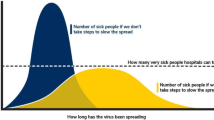Abstract
Social media is now close access for communication and dialectics. This study aims to examine the role of social media in eradicating corruption that occurred during the COVID-19 pandemic in Indonesia because during the pandemic there was an increase in corruption carried out by state officials. This study uses descriptive qualitative research methods, data processing using Nvivo 12 plus software, with the stages of data collection, data import, data coding, data classification, and data display the data is taken through Twitter social media by looking at the public discussion of corruption in Indonesia, to enrich the data, researchers target news in the media and see what news appears related to corruption in Indonesia. pandemic period. So that the results of the study will show how and what models of corruption eradication emerged during the pandemic. At the end of the research, the researcher will present knowledge of corruption crimes committed by state officials so that the public can anticipate the occurrence of corruptionKeyword: Corruption, Social Media, Covid-19.
Access this chapter
Tax calculation will be finalised at checkout
Purchases are for personal use only
Similar content being viewed by others
References
Sefriani, R., Sepriana, R., Wijaya, I., Radyuli, P.: Menrisal, blended learning with edmodo: the effectiveness of statistical learning during the covid-19 pandemic. Int. J. Eval. Res. Educ. 10(1), 293–299 (2021). https://doi.org/10.11591/IJERE.V10I1.20826
Mykhailenko, G.M., Cheremisin, A.V.: Corruption and bribery in towns of the south of Ukraine during the period of 1785–1870. Public Policy Adm. 18(4), 509–523 (2019). https://doi.org/10.13165/VPA-19-18-4-10
Vikhryan, A.P., Fedorov, M.V.: Anti-corruption education as a factor of social security∗. Rudn J. Soc. 20(4), 967–976 (2020). https://doi.org/10.22363/2313-2272-2020-20-4-967-976
Tolstykh, V., Grigoryan, M., Kovalenko, T.: Legal systems of the post-soviet non-recognized states: structural problems. Russ. Law J. 7(2), 81–100 (2019). https://doi.org/10.17589/2309-8678-2019-7-2-81-100
Sapsford, R., Tsourapas, G., Abbott, P., Teti, A.: Corruption, trust, inclusion and cohesion in North Africa and the Middle East. Appl. Res. Qual. Life 14(1), 1–21 (2017). https://doi.org/10.1007/s11482-017-9578-8
Purwaningsih, T., Widodo, B.E.C.: The interplay of incumbency, political dinasty and corruption in indonesia: are political dynasties the cause of corruption in Indonesia? Rev. UNISCI 2020(53), 157–176 (2020). https://doi.org/10.31439/UNISCI-89
Brannum, K.: Guatemala 2018: facing a constitutional crossroad. Rev. Cienc. Polit. 39(2), 265–284 (2019). https://doi.org/10.4067/S0718-090X2019000200265
Simarmata, M.H., Ham, D., Hukum, K.: Peranan e-Government dan media sosial untuk Mewujudkan Budaya transparansi dan Pemberantasan Korupsi. J. Integritas 3(2), 203–229 (2017)
Balimula, S., et al.: Perancangan Kampanye Media Sosial tentang Nilai-Nilai Anti Korupsi untuk Anak-Anak Sekolah Dasar di Surabaya (2019)
Kurniawan, D., Nurmandi, A., Salahudin, S., Mutiarin, D., Suswanta, S.: Analysis of the anti-corruption movement through twitter social media: a case study of Indonesia. In: Antipova, T. (eds) Advances in Digital Science. ICADS 2021. Advances in Intelligent Systems and Computing, vol. 1352, pp. 298–308. Springer, Cham (2021). https://doi.org/10.1007/978-3-030-71782-7_27
Eka, A.G., Wuryanta, W.: Digitalisasi masyarakat: Menilik kekuatan dan kelemahan dinamika era informasi digital dan masyarakat informasi. J. Ilmu Komun. 131–142 (2013)
Kebung, K.: Membaca kuasa michel foucault dalam konteks kekuasaan di Indonesia. Melintas 33(1), 34–51 (2018). https://doi.org/10.26593/mel.v33i1.2953.34-51
Syahputra, I.: Post media literacy: menyaksikan kuasa media bersama michel foucault. J. ASPIKOM 1(1), 1 (2017). https://doi.org/10.24329/aspikom.v1i1.4
Syauket, A., Lestari, S.P., Simarmata, R.P.: Inovasi Birokrasi Pemerintahan Anti Korupsi Berbasis Teknologi Informasi Dan Komunikasi ( Melihat Kebijakan E-Procurement ). Jurnal Manajemen Publik dan Kebijakan Publik (JMPKP), 2(2), 92–99 (2020)
Setiawan, R.E.B., Nurmandi, A., Muallidin, I., Kurniawan, D., Salahudin, S.: Technology for governance: comparison of disaster information mitigation of COVID-19 in jakarta and West Java. In: Ahram, T., Taiar, R. (eds.) Human Interaction, Emerging Technologies and Future Systems V. IHIET 2021. Lecture Notes in Networks and Systems, vol. 319. Springer, Cham. https://doi.org/10.1007/978-3-030-85540-6_17
Author information
Authors and Affiliations
Corresponding author
Editor information
Editors and Affiliations
Rights and permissions
Copyright information
© 2022 The Author(s), under exclusive license to Springer Nature Switzerland AG
About this paper
Cite this paper
Aslam, Nurmandi, A., Muallidin, I., Kurniawan, D. (2022). The Use of Social Media in Controlling of Corruption During the Covid-19 Pandemic in Indonesia. In: Stephanidis, C., Antona, M., Ntoa, S. (eds) HCI International 2022 Posters. HCII 2022. Communications in Computer and Information Science, vol 1582. Springer, Cham. https://doi.org/10.1007/978-3-031-06391-6_46
Download citation
DOI: https://doi.org/10.1007/978-3-031-06391-6_46
Published:
Publisher Name: Springer, Cham
Print ISBN: 978-3-031-06390-9
Online ISBN: 978-3-031-06391-6
eBook Packages: Computer ScienceComputer Science (R0)




